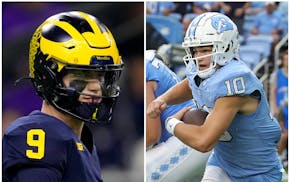The NHL season reached its halfway point this week, which doesn't even seem possible, since the lockout just ended the other day, right?
The breakneck pace of 48 games in 99 days has made the season feel as if it's being played on a fast-forward setting. If a normal season is viewed as a marathon, this one is a Usain Bolt 100-meter dash.
Teams can rise or plummet in the standings faster than a coffee walk. Technically, the Wild has 22 games remaining or, in other words, the team has begun its stretch run.
Too bad it's not like this every year.
The lockout became a painful exercise of stubbornness, but the resulting truncated season has produced compelling hockey because every game feels doubly important. Owners never would forgo the financial reward of an 82-game season long term, of course. But even casual hockey fans who typically wait until the playoffs to pay attention can enjoy this product.
"This has probably been the most fun that I've had in a season," Wild veteran Matt Cullen said. "I love it. We just play games. Not a lot of practices, not a lot of downtime to think about everything."
That's because everything is so fluid. Sharp fluctuations in the standings make this season equal parts exhilarating and stressful for those involved. The daily jockeying puts a premium on every game because teams only play conference opponents, which makes those two points actually feel like four.
"You know if you lose a game you're probably going to drop three or four spots," Wild winger Devin Setoguchi said.
Cullen makes a point to check the standings every morning. He figures he might as well start his day with a good laugh.
"One day it was three points separating third place in the West from 11th," he said. "Three points. That's two nights."
The Wild awoke Friday trailing only Vancouver in the Northwest Division and tied for fifth in the Western Conference with 30 points. The team embarked on a three-game road trip, which would resemble a recent Carnival cruise if the team returns home with zero points.
"Good teams don't lose two in a row," center Mike Rupp said.
Losing streaks are compounded by that sense of urgency. Inevitably, teams have games that are just clunkers. They don't play with energy or they can't seem to do anything right. Those nights happen. But teams can't afford to let those snowball into something worse.
"It can be devastating for some teams if you go through a stretch like that," Cullen said.
That pressure has stripped away some of the patience that teams otherwise might exhibit if a player hits a rough patch. Teams can't wait long for players to work themselves out of a slump (See: Pierre-Marc Bouchard, a healthy scratch recently in three consecutive games.) That's also why you see coaches — and not just Mike Yeo — constantly shuffling line combinations in search of a spark. Yeo tried roughly 832 different line pairings early in the season as his team struggled to score goals.
The biggest hurdle, Yeo said, is scarce practice time. Coaches in every sport lament not having enough practice time, but health preservation takes precedence in a condensed season. This is Allen Iverson's dream season — very few practices.
"I don't know if we could be doing this every year," Wild tough guy Zenon Konopka said. "If we played 48 games, it would be great [laughing]. Maybe spread them out. But it's awesome. I think it's just amazing."
Players refer to games as playoff hockey because they are more intense than a typical mid-season game in a normal season. Konopka compared the mindset to an NFL season in which every game means something. Cullen said he's noticed a change in intensity even in the past 10 days.
"You have that playoff mentality," he said. "As soon as you get off the ice after a playoff game, win or lose, you've got to put it away and start thinking about the next one. You can't waste time and energy thinking about the last game and being ticked about something. It's so important this year more than any to keep that even keel."
That's not easy when so much is riding on every game. Teams feel desperate to keep pace, knowing a bad few games could send them tumbling in the standings with little time to make up ground.
"It's a Catch-22," Konopka said. "You don't want to panic if you lose two or three games. But it's hard not to because you find yourself falling in the standings maybe seven or eight spots."
Or vice versa. That's the beauty of this season. Every win or loss feels significant.
This is our reward for that lousy lockout.
Chip Scoggins • ascoggins@startribune.com
Scoggins: 'Wait one more year' can't be the Wild's plan. Thankfully, it isn't.

Scoggins: Finch feeling heat of the Suns as playoff battle looms
Scoggins: Why 'championship or bust' fits these Wolves

Scoggins: Anatomy of a game-saving play as Correa throws out Ohtani

